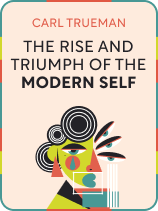

This article is an excerpt from the Shortform book guide to "The Rise and Triumph of the Modern Self" by Carl Trueman. Shortform has the world's best summaries and analyses of books you should be reading.
Like this article? Sign up for a free trial here.
Why is the Christian view of sexuality no longer mainstream? What has taken its place?
In The Rise and Triumph of the Modern Self, Carl Trueman argues that cultural developments of the past three centuries have transformed our conception of selfhood and, along with it, our conception of sexuality. He explores the ways the traditional Christian view of sexuality has been supplanted.
Keep reading for this intriguing discussion of sexuality in the context of societal transformation.
The Demise of the Christian View of Sexuality
Trueman points out that modern selfhood differs from traditional Christian understandings of selfhood in several ways. A couple of these differences relate to sexuality:
- The modern self is sexual. Trueman argues that modern culture places sexual desires and preferences at the core of selfhood. To live authentically, a modern self must express sexual preferences and find sexual fulfillment.
- The modern self is free to demand recognition from others. It’s not enough to just express one’s feelings and desires. A modern self can demand that others recognize, affirm, and validate the identity they have chosen for themselves, especially their sexual and gender identity.
This modern conception of the self inevitably leads to a culture that casts aside the Christian view of sexuality. Trueman explains that traditional Christian teachings hold that human nature is universal and not determined by the individual. It also maintains that sex should take place only in a context of a committed, monogamous marriage. Sex fulfills a sacred moral purpose of procreation and not just the simple gratification of sexual desire.
Furthermore, Trueman asserts that traditional Christian teachings define marriage as a contract between a man and a woman, barring the possibility of same-sex marriage. Lastly, Christianity holds that a person’s gender is identical to their biological sex, rejecting the possibility of transgender identities.
The modern self undermines all of these teachings. It encourages people to pursue sexual desires and identities as an expression of their authenticity while labeling those who would restrict this behavior as oppressors.
(Shortform note: Research supports Trueman’s characterization of Christian sexual morality as in tension with modern views and ideas: US polling data shows declining support for Christian sexual morals that cleaves along religious lines. The last two decades have shown both an unprecedented rise in support for same-sex marriage and an unprecedented decline in religious affiliation. Furthermore, religious affiliation strongly predicts support for both sex outside of marriage and gender identities that differ from sex at birth.)
Separating Sex From Gender
Trueman states the sexual nature of selfhood continued to change as feminists began to separate biological sex from cultural gender. Trueman explains that the traditional Christian understanding of gender holds that it’s determined by biology rather than culture: Someone is born with male or female anatomical parts, and that determines whether they’re male or female.
However, during the 20th century, feminist philosophers began to suggest that while sex may be determined by biology, gender was a social construct and therefore, created by culture. In particular, the feminist Simone de Beauvoir asserts that “woman” is a cultural category that is imposed on people. She argues that women are expected to assimilate into the role of woman. This role, she explained, was not determined by the natural order of the world, but through socially constructed norms and expectations.
Recall that the modern self is at odds with culture and society that restricts its authenticity. By relocating “womanhood” from the “self” to “culture,” Beauvoir places traditional understandings of gender at odds with the interior, authentic self, which is then free to reject the social construct of “womanhood.”
Ubiquitous Pornography
Trueman contends that the modern self has paved the way for the widespread acceptance and normalization of pornography. If sexual desires are simply part of an authentic life, then there is very little moral ground to object to fulfilling those desires by consuming pornography. Furthermore, those who object to pornography may be cast as trying to impose a restrictive puritanism on others.
Trueman maintains that pornography is highly destructive to morality. By prioritizing the gratification of the individual consumer, pornography detaches sexuality from its greater moral context of relationships and procreation.
(Shortform note: A growing body of research is identifying the detrimental impacts of pornography. Many users have found themselves addicted and struggling to control their pornography consumption. Researchers have found that it can also be detrimental to relationships as heavy users may lose sexual interest in their partners. Furthermore, adolescent males may learn distorted expectations about sex that will then impact their future relationships. However, some psychologists maintain that people with pre-existing mental health conditions are at much greater risk for pornography addiction and that the distorted messaging for young males can be counteracted through education.)
The Rise of the LGBTQ+ Movement
Trueman contends that the rise of the LGBTQ+ movement—a political alliance organized around the interests of gay, lesbian, and transgender people—depends on an understanding of the self that is individually determined, at odds with traditional culture, and highly sexual. Furthermore, Trueman explains that this movement’s aims are opposed to traditional Christian values and destructive to the continuation of Christian culture.
Furthermore, a sense of oppression from persecution fundamentally shapes trans identity. The modern self places authenticity in opposition to culture. Therefore, those who advocate traditional gender identities can be cast as antagonists to authentic selfhood. And because Freudian Marxists defined oppression as psychological, those who reject transgender identities are now widely seen as “oppressors.” Thus, the widespread acceptance of transgender identities in the context of modern selfhood directly leads to the moral stigmatization of traditional Christians.
Marriage Redefined
Lastly, Trueman maintains that a redefinition of marriage is an inevitable outcome of the modern conception of selfhood. He makes this case by contrasting traditional Christian marriage with the modern view of marriage.
Traditional Christian marriage fulfills the sacred purpose of creating children and a stable home for them. The modern conception of marriage makes marriage about the emotional fulfillment of the partners getting married. Trueman pushes back on defenders who claim that this is merely an expansion of traditional marriage. Instead, Trueman considers this a destruction of traditional marriage, because this detaches marriage from the sacred moral framework and places it in the framework of the modern, feeling self.

———End of Preview———
Like what you just read? Read the rest of the world's best book summary and analysis of Carl Trueman's "The Rise and Triumph of the Modern Self" at Shortform.
Here's what you'll find in our full The Rise and Triumph of the Modern Self summary:
- How the modern conception of selfhood has changed over the centuries
- How Christian views have become stigmatized, damaging Western culture
- What modern Christians can do to preserve traditional values






